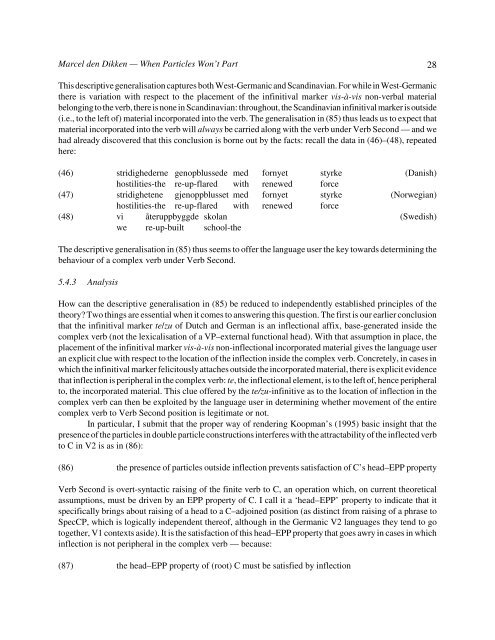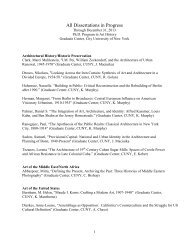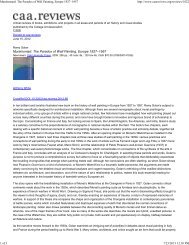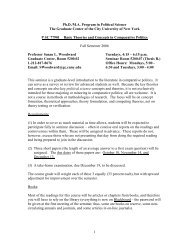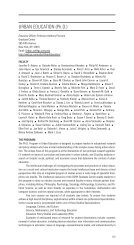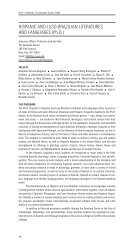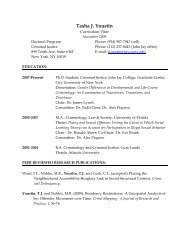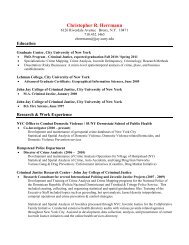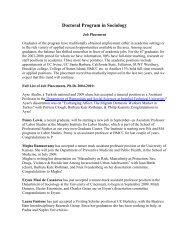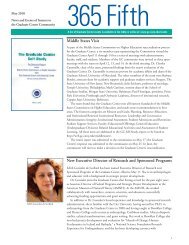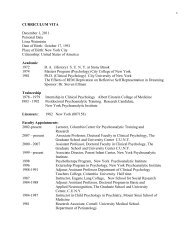When Particles Won't Part - CUNY Graduate Center
When Particles Won't Part - CUNY Graduate Center
When Particles Won't Part - CUNY Graduate Center
You also want an ePaper? Increase the reach of your titles
YUMPU automatically turns print PDFs into web optimized ePapers that Google loves.
Marcel den Dikken — <strong>When</strong> <strong><strong>Part</strong>icles</strong> Won’t <strong>Part</strong><br />
This descriptive generalisation captures both West-Germanic and Scandinavian. For while in West-Germanic<br />
there is variation with respect to the placement of the infinitival marker vis-à-vis non-verbal material<br />
belonging to the verb, there is none in Scandinavian: throughout, the Scandinavian infinitival marker is outside<br />
(i.e., to the left of) material incorporated into the verb. The generalisation in (85) thus leads us to expect that<br />
material incorporated into the verb will always be carried along with the verb under Verb Second — and we<br />
had already discovered that this conclusion is borne out by the facts: recall the data in (46)–(48), repeated<br />
here:<br />
(46) stridighederne genopblussede med fornyet styrke (Danish)<br />
hostilities-the re-up-flared with renewed force<br />
(47) stridighetene gjenoppblusset med fornyet styrke (Norwegian)<br />
hostilities-the re-up-flared with renewed force<br />
(48) vi återuppbyggde skolan (Swedish)<br />
we re-up-built school-the<br />
The descriptive generalisation in (85) thus seems to offer the language user the key towards determining the<br />
behaviour of a complex verb under Verb Second.<br />
5.4.3 Analysis<br />
How can the descriptive generalisation in (85) be reduced to independently established principles of the<br />
theory? Two things are essential when it comes to answering this question. The first is our earlier conclusion<br />
that the infinitival marker te/zu of Dutch and German is an inflectional affix, base-generated inside the<br />
complex verb (not the lexicalisation of a VP–external functional head). With that assumption in place, the<br />
placement of the infinitival marker vis-à-vis non-inflectional incorporated material gives the language user<br />
an explicit clue with respect to the location of the inflection inside the complex verb. Concretely, in cases in<br />
which the infinitival marker felicitously attaches outside the incorporated material, there is explicit evidence<br />
that inflection is peripheral in the complex verb: te, the inflectional element, is to the left of, hence peripheral<br />
to, the incorporated material. This clue offered by the te/zu-infinitive as to the location of inflection in the<br />
complex verb can then be exploited by the language user in determining whether movement of the entire<br />
complex verb to Verb Second position is legitimate or not.<br />
In particular, I submit that the proper way of rendering Koopman’ s (1995) basic insight that the<br />
presence of the particles in double particle constructions interferes with the attractability of the inflected verb<br />
to C in V2 is as in (86):<br />
(86) the presence of particles outside inflection prevents satisfaction of C’ s head–EPP property<br />
Verb Second is overt-syntactic raising of the finite verb to C, an operation which, on current theoretical<br />
assumptions, must be driven by an EPP property of C. I call it a ‘head–EPP’ property to indicate that it<br />
specifically brings about raising of a head to a C–adjoined position (as distinct from raising of a phrase to<br />
SpecCP, which is logically independent thereof, although in the Germanic V2 languages they tend to go<br />
together, V1 contexts aside). It is the satisfaction of this head–EPP property that goes awry in cases in which<br />
inflection is not peripheral in the complex verb — because:<br />
(87) the head–EPP property of (root) C must be satisfied by inflection<br />
28


